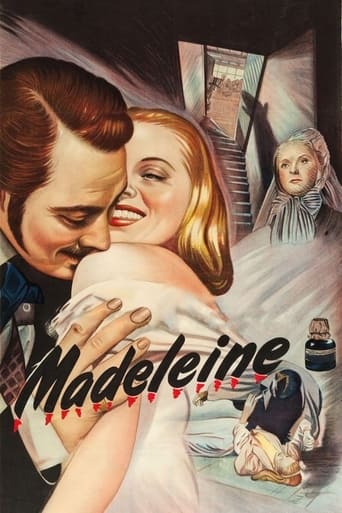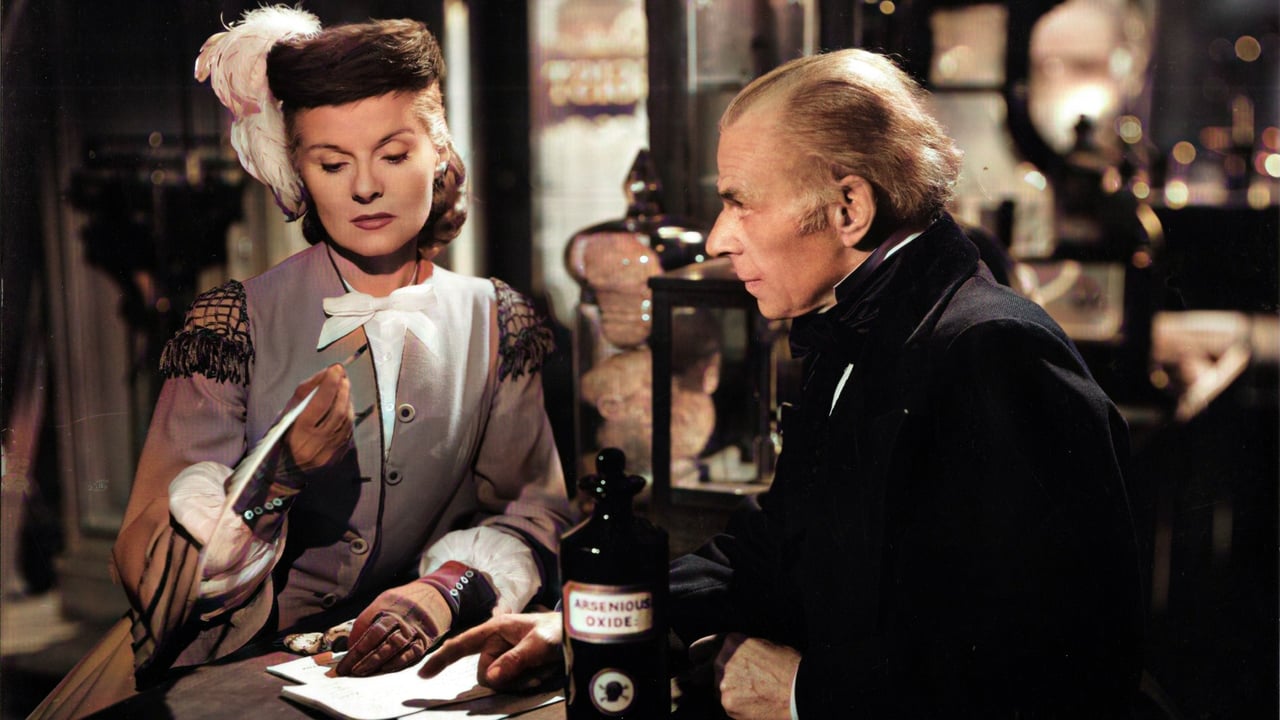blanche-2
Ann Todd is "Madeleine" in this 1950 film directed by David Lean. The film also features Norman Wooland, Ivan Desny, Andre Morrell and Elizabeth Sellars. The film looks at the true story of the famous Madeleine Smith murder trial in the mid-1800s. Pressured by her upper class family to marry, Madeleine is in fact secretly intimately involved with a man from a lower class, L'Anglier (Desny) and has agreed to marry him. She doesn't want to tell her family, so she urges him to elope with her. L'Anglier was planning on marrying into the upper class lifestyle and insists instead that she tell her father (Leslie Banks) about their relationship. She can't, and believing that all L'Anglier wanted was her money all along, she breaks off with him and requests the return of her letters to him. She then agrees to marry William Minnoch (Wooland), who has been courting her.L'Anglier doesn't return her letters, and after she purchases arsenic, he dies of arsenic poison, having become ill at her house once before. Madeleine is arrested for murder.The film seems to follow the case quite accurately, but it's pretty cut and dried. There are some marvelous scenes - the two dancing in the moonlight is one, as an increasingly wilder dance goes on inside. The structure of the courtroom was interesting, as I had never seen a prisoner walk upstairs into the dock from what is almost a trap door in the floor. The view of all the faces looking down before she starts the climb gives an idea of what it's like to be put on trial.Ann Todd is a good actress, though an internalized one who comes off as rather cold. She was married to Lean, which may be the reason for her casting. At the time of the murder, Madeleine's father was displeased that she wasn't married, complaining that she had met many men but none of them have worked out. She was twenty when she took up with L'Anglier and 22 when she broke it off. Todd was 41 at the time this film was made. She was not carefully photographed and looked her age - way too old for this role. Andre Morrell is excellent as Madeleine's attorney. The rest of the performances are very good, with Banks a strong, intimidating father and Desny hinting at the slime that's below the surface of L'Anglier. Norman Wooland gives a charming and concerned performance as Madeleine's suitor, Minnoch.Lean's opinion of what happened is made very clear in the last moments of the film. Someone said the story needed Hitchcock's hand, but he was not successful with "The Paradine Case." There's something about these stories that is very detached and unemotional. Maybe Hitchcock could have cracked it; this early effort by David Lean doesn't quite make it.
Jem Odewahn
Excellent and unjustly overlooked David Lean film starring his then-wife Ann Todd, "Madeleine" is terrific drama, and perhaps one of Lean's best-directed films. Todd is the young Glasgow beauty Madeleine Smith, brought to trial in 1857, accused of murdering her lover by lacing his cocoa with arsenic. In sensational scenes, Madeleine was allowed to walk free, proved neither guilty or innocent through a lack of evidence. Lean takes an interesting approach with his subject matter here. The casting of Ann Todd, a blonde, glacial and enigmatic presence serves to be the director's strong point, as the ambiguity of Madeleine Smith's motivations are increased.Cinematographer Guy Green worked with Lean on the two Dickens adaptations before this film, and he once again shows absolute mastery of black-and-white images in this film. There are many strikingly composed shots in this film, not least the scenes between Todd and her lover, played by Ivan Desny. Madeleine hands him his cup of cocoa, and the shot is framed so the cup is in the foreground, alerting the viewer's attention and questioning Madeleine's motives as she focuses on the drink. At once we suspect her, knowing she has bought and used arsenic, but then doubt creeps back into our mind. Why would she let the young shop clerk and her maid both witness her buying arsenic, when it would have been much more clever of the woman to procure the poison by less public means? Another striking scene has Madeleine's tryst with her lover played out in the dark of night as she removes her shoes and dances to a Scottish song playing in the distance. At once Madeleine is free of the ties that bind her in the staid Victorian England, and her joyful, seductive dancing is inter-cut with rollicking, very physical scenes at the dance. Soon Madeleine is on the ground, losing her shawl. We fade to black, and Lean has very implicitly informed us about the nature of their relations.The acting is generally very good, with the leading players adding authenticity to their roles. Norman Wooland plays the wealthy, upstanding young man who courts Todd while she is still carrying on an affair with Desny. Elizabeth Sellars is also memorable as Todd's maid.Most historians believe the woman was guilty of the crime, as she certainly was in possession of arsenic in the weeks leading up to her lover's death, but Lean chooses to direct in a detached manner, and by the film's end we are still pondering "Did she or didn't she?". Todd gives a curious half-smile to the camera in the final close-up shot. Is it a smile of a woman who has survived a terrible ordeal, or the smile of a murderer?
moonspinner55
A boarding-house Lothario in 1857 Glasgow dies from arsenic poisoning; a stack of incriminating letters point the finger at the man's secret lover, an unmarried high society woman who has recently announced her engagement to a man of her class. True story which held Victorian Scotland spellbound is given handsome, but not elaborate treatment from director David Lean. Lean's then-wife Ann Todd reportedly played Madeleine Smith on the stage (not credited here) and her assets--steely eyes, a knitted-brow and taut mouth--are in perfect accompaniment with this inscrutable character, who may or may not be what she seems. Lean captures the allure of a clandestine romance, with the screen fading to black as the lustiness becomes palpable, and his third act in the courtroom is quite lively. Still, this seems to be a lot of striding up and down for a fairly certain verdict, and the conclusion is curiously flat. Columbo could've solved this case in an hour. ** from ****
Steffi_P
Madeleine is one of a number of costume dramas produced around the late 1940s to focus upon psychological conflicts from a female perspective. Other notable examples are Vincente Minelli's Madame Bovary and William Wyler's The Heiress, both released in 1949. However, whereas those two pictures were based upon great literary works from the 19th century, Madeleine is a dramatisation (I would imagine a fairly liberal one given its melodramatic style) of actual events.Director David Lean was always one to immerse the audience in the psychological states of his characters, often through use of attention grabbing shots and expressive use of sound. There are some fairly routine examples of this in the first half of the film eerie shadows of Emile twirling his cane, the blaring bagpipe music of a village dance at Emile and Madeleine's secret meeting, and so on.Another of Lean's characteristics was that, in order to tell a full story, the narrative would switch between the multiple points-of-view. This can be done fairly easily with a director who treats the audience as a passive, externalised viewer, but with Lean's constant involvement of the audience it could occasionally give his films a disjointed, unbalanced feel. This is somewhat the case with Madeleine, which begins as a psychological drama in which a young woman from a strict household must choose between her heart's desire and loyalty to her family. About halfway through however the story becomes a murder mystery and eventually a courtroom drama, and the narrative fragments as we see the points-of-view of various witnesses to supposed crimes. All the psychological set-up of the first forty-five minutes becomes forgotten.In spite of the fragmentary nature of the whole, there are some strong scenes and the occasional touch of class here and there. The pivotal scene in which Madeleine's father discovers his daughters affair, while at the same time Madeleine learns of Emile's death shows Lean's dramatic staging at its best. Intelligent use of space and positioning of actors in this scene best shows off the varying reactions. The final scenes in court are a carefully constructed blend of points-of-view and reaction shots, and Lean's background as a renowned editor is in evidence.A great cast was often a hallmark of a David Lean picture, but Madeleine suffers from a lack of classy actors. Having said that Ann Todd, whom I don't normally rate that highly, is not too bad here, emoting well in close-ups. Apart from that the only standouts are Andre Morell in a powerful performance as the defence counsel towards the end of the film, and an unfortunately brief appearance from Scottish character actor John Laurie as a fanatical mob leader.Madeleine has its moments, but all in all is a bit of a mediocrity. Lean was at his best when he could go all out on the emotional drama, but this foray into the courtroom is simply not enough of one thing or the other to be a really strong picture.


 AD
AD



